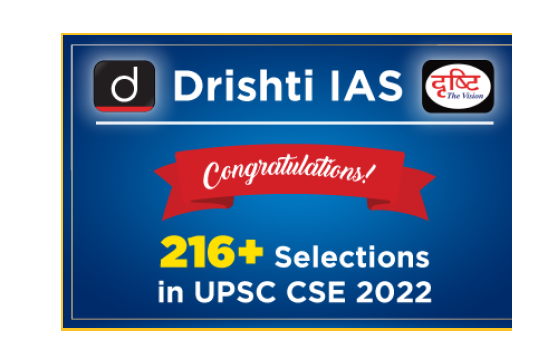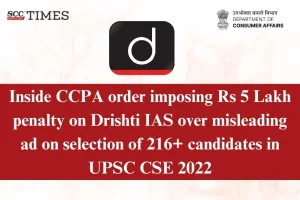Central Consumer Protection Authority (CCPA): While considering this suo motu matter revolving around an advertisement by Drishti IAS (VDK Eduventures Pvt. Ltd.), concerning selection of 216+ candidates in UPSC CSE 2022; the Bench of Nidhi Khare (Chief Commissioner) and Anupam Mishra (Commissioner), found the claim made in the impugned advertisement to be misleading and directed Drishti IAS to pay penalty of Rs 5 Lakhs for publishing the misleading advertisement.
Background:

The case revolved around an advertisement by Dristi IAS (opposite party) on its official website which claimed- “216+ selections in UPSC CSE 2022”. Taking suo motu cognizance of the matter, the CCPA under Section 19 of the Consumer Protection Act, 2019, conducted preliminary inquiry to examine authenticity of the claims in the impugned advertisement. The CCPA prima facie observed that the opposite party had allegedly published the claim/advertisement prominently featuring the pictures and names of successful candidates from UPSC CSE 2022 and simultaneously advertised various types of courses provided by them on its official website while concealing important information such as the specific courses opted for by the successful candidates.
CCPA issued a notice dated 31-08-2023 to the opposite party for violation of provisions of the Consumer Protection Act, 2019 highlighting the issue of alleged misleading advertisement by concealing important information i.e. specific courses opted by the successful candidates. An opportunity to furnish response within 15 days of the issue of the Notice was given to the opposite party. Upon receipt of response, the CCPA provided an opportunity of hearing to the opposite party on 25-10-2023; however, opposite party failed to appear for the hearing. Therefore, upon examining the opposite party’s response, the CCPA requested the Director General (Investigation) [DG] to conduct a detailed investigation into the matter.
The DG submitted its report finding that out of the 216 candidates, 162 were enrolled in Interview Guidance Program (IGP) and 54 candidates were enrolled in IGP+ other courses. This information should have been mentioned in the advertisement so that the potential aspirants and their parents/guardians could make informed decision. In the present case, out of claimed 216+ candidates, 162 candidates (75% of total claimed selections) cleared the Pre and Mains stage of UPSC CSE, 2022 without any assistance of Drishti IAS Institute. They had taken free Interview Guidance Program (IGP). This information was vital for consumers (students) in choosing the right coaching institute. The DG thus found that Drishti IAS in the impugned advertisement had deliberately concealed this important information from prospective consumers as a class. The advertisements by the Drishti IAS which claimed 216+ selected candidates should have also mentioned the type/name and duration of the course opted by the selected candidate so that potential aspirants can make well informed choice as its consumer right.
Assessment by CCPA:
Perusing the response filed by the opposite party on the DG’s investigation, the CCPA pointed out that Section 2(28) of the Consumer Act defines “misleading advertisement” in relation to any product or service means an advertisement. Section 2(1) of the Consumer Act defines “advertisement”. Therefore, opposite party’s visual publicity, representation, endorsement or pronouncement of UPSC CSE exam 2022 result while prominently displaying successful candidate’s names & pictures by means of electronic media, internet or website comes under definition of advertisement.
The CCPA further stated that it is empowered upon satisfaction of a prima facie case, to cause an investigation to be conducted by the Director General or by the District Collector. Such directions are internal administrative directions, meant only to set the investigative process in motion, and do not constitute adjudicatory orders against the opposite party. The CCP further pointed out that Section 19 under which the CCPA directs the DG to conduct investigation, does not provide any opportunity of being heard. The opportunity of hearing is explicitly built into Sections 20 and 21 of the Consumer Act, where parties are served with the investigation report, allegations, and evidence, and are afforded full opportunity to respond before any adverse order is passed.
Taking note of opposite party’s contention that at the time of action, no official guidelines existed for regulating coaching advertisements, the CCPA found the argument to be untenable. The Consumer Protection Act, 2019, is a self-contained and comprehensive legislation that explicitly defines “misleading advertisements” under Section 2(28). The Act does not necessitate sector-specific guidelines for its applicability, as its provisions sufficiently empower the CCPA to regulate matters relating to violation of rights of consumers, unfair trade practices and false or misleading advertisements which are prejudicial to the interests of consumers. The CCPA further pointed out that the Consumer Protection Act unequivocally empowers the CCPA to regulate violations of consumer rights, including false and misleading advertisements, regardless of the existence of sector-specific guidelines.
The CCPA took note of the fact that several coaching institutes including opposite party prominently used successful candidate’s names and pictures of successful candidates of UPSC CSE 2022 on its official platforms & newspaper while deliberately concealing important information such as course opted by them to create deception as if the successful candidates were regular classroom students of coaching institutes. The CCPA noted that as DG’s report, 162 students (75%) out the 216+, cleared the Prelims and Mains stage without any assistance of opposite party. These 162 candidates had availed the free IGP. The CCPA stated that interview is an important stage, but the competition at the stage of prelims and mains is stiff, considering the larger number of candidates competing in those stages.
This information was important for consumers to know. Opposite party in the impugned advertisement had concealed this important information from consumers regarding specific course opted by successful candidates and adopted unfair or deceptive trade practices.
It was pointed out that in the instant case, opposite party through its misleading advertisement has been found to be taking credit of successful candidate’s efforts and success for all the stages of the examination by deliberately concealing important information about the specific course taken by the successful candidates. CCPA further observed that in the advertisement, opposite party simultaneously advertised its various courses including Mentorship Program, Asmita Scholarship, Foundation Course, Optional Subject Courses, Mock interviews, Online coaching and made it look like all the courses offered through the impugned advertisement had the same success rate for the consumers, which was not true. This concealment of important details affected the ability of potential students (consumers) to make a well-informed choice about which courses to enroll and at what stage of their preparation of Civil Service Examination.
Only 54 students out of 21 had enrolled in the courses other than IGP. The numbers did not favour the opposite party to attract these students. Therefore, it was in the vested interest of the opposite party to conceal the Institute’s lacklustre statistics of just 54 candidates out of 216 candidates who had enrolled for the other stages. This concealment was therefore deliberate.
The CCPA further stated that by presenting an untrue, incomplete and misleading claim, the opposite party had engaged in misleading advertisement, warranting corrective measures. Additionally, it is important to note that this misleading claim was published on the institute’s official website, which significantly increases its reach and influence over consumers across the country. A website is accessible nationwide and even globally, allowing a larger number of consumers to be misled by the false impression created.
Therefore, the CCPA was satisfied that the opposite party had engaged in ‘misleading advertisement’ within the meaning of Section 2(28) of the Consumer Protection Act, 2019 as it had deliberately concealed an important information with respect to the course opted by successful candidates and thus mislead consumers as a class. In view of the above, CCPA opined that it was necessary to impose a penalty in consumer interest. The CCPA further noticed that even after issue of notice by CCPA for misleading claim of 150+ selection for UPSC CSE 2021, the opposite party has enhanced the claim to 216 + selections. “The opposite party was aware of the issue raised by CCPA for 2021 advertisement, even then the opposite party continued to conceal the information in 2022 advertisement”.
Therefore, considering that Drishti IAS has 7 offline centres and also provides online coaching; 11,00,000 students apply for UPSC exams thereby creating a large pool of potential consumers; Drishti IAS removing the ad during the pendency of the proceedings and nature of the violations committed by Drishti IAS, the CCPA deemed it fit to impose penalty of Rs 5 Lakhs.
[In the matter of: Misleading advertisement by Drishti IAS (VDK Eduventures Pvt. Ltd.), CCPA-2/69/2023-CCPA, order dated 30-9-2025]
Advocates who appeared in this case:
For Drishti IAS: –
Mr. Sumeer Sodhi, Advocate; Ms. Kanika Bhatia, Representative of Drishti IAS; Mr. Gaurav Bana, Representative of Drishti IAS; Mr. Kartikay Garg, Advocate

